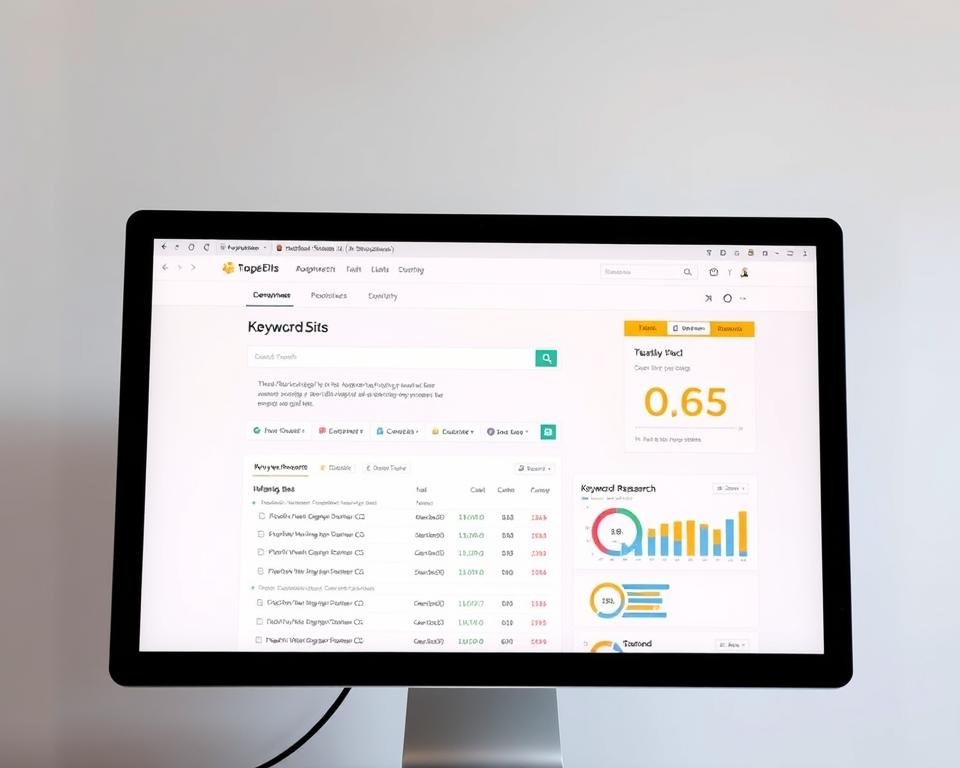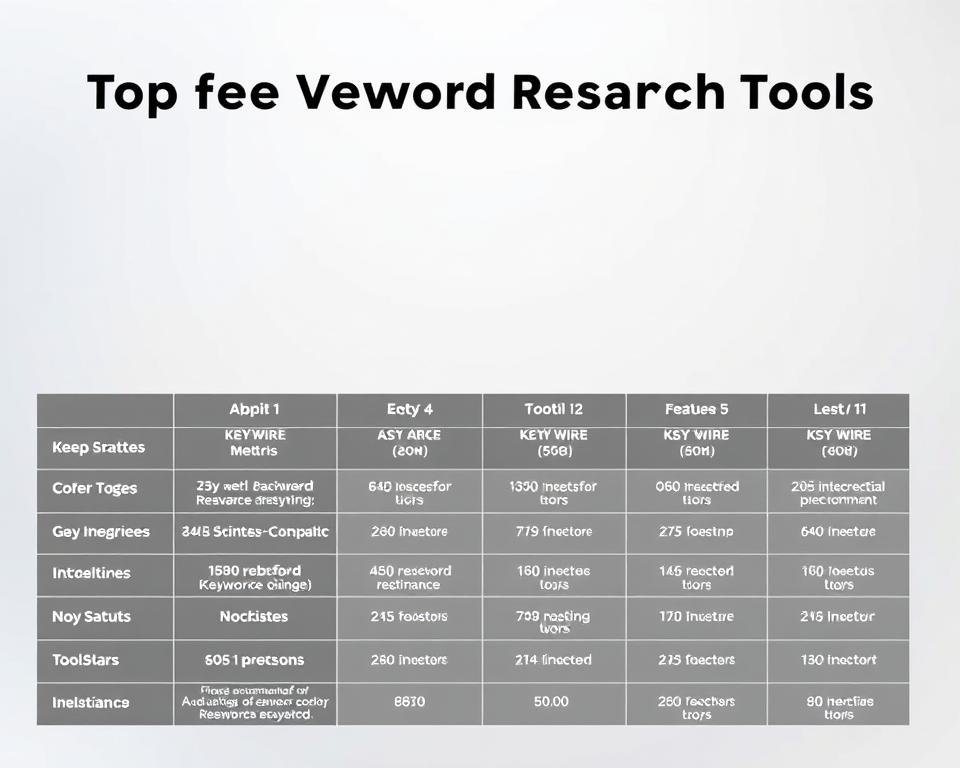As a pro in SEO, I know using the right keyword research tools is key. Good keyword research helps businesses rank better in search results. It’s the heart of planning content.
The right tools can change everything. That’s why I’m sharing five top free keyword tools that work well. They’re easy to use, great for pros and beginners alike.
Key Takeaways
- Discover the top free keyword research tools that can enhance your SEO strategy.
- Learn how to use these tools to improve your content planning.
- Understand the benefits of using the right keyword research tools for your business.
- Explore the features of the best keyword research tools.
- Find out how these tools can help you rank higher in search engine results.
Introduction to Keyword Research Tools
Keyword research is key to a good SEO plan. It helps find the right words to use. This makes your content better for your audience and boosts your ranking.
Keyword research is more than guessing what people might search for. It needs a smart plan and the right tools. These tools find out what your audience looks for. Then, you can make your content fit their needs.
Why Keyword Research is Important
Keyword research is vital because it shows what your audience searches for. Knowing this lets you make content that matters to them. This makes your site more visible and better for users.
Understanding search intent is a big part of keyword research. It’s not just finding keywords. It’s also about knowing why people search for them.
How It Can Benefit Your SEO Strategy
Adding keyword research to your SEO plan has many benefits. It helps you find market gaps, improve your content for better rankings, and make your site more visible.
With the right tools, like free SEO tools or a keyword planner, you can do your research better. This helps you make your SEO efforts stronger.
Tool
I’ll start by looking at Google Keyword Planner, a top keyword tool. It’s loved by marketers for its precise and fitting keyword ideas.
Google Keyword Planner shines because it works well with Google Ads. This makes it easy to go from finding keywords to setting up ads. It gives a full list of keyword ideas, along with search volume and how competitive they are.
Key Features of Google Keyword Planner:
- Keyword suggestions based on search volume and relevance
- Competition analysis to help refine keyword strategy
- Integration with Google Ads for streamlined campaign creation
Now, let’s see how Google Keyword Planner stacks up against other tools.
| Tool | Keyword Suggestions | Competition Analysis | Integration with Google Ads |
|---|---|---|---|
| Google Keyword Planner | Yes | Yes | Yes |
| Ubersuggest | Yes | Limited | No |
| AnswerThePublic | Yes | No | No |
The table shows Google Keyword Planner has great features for keyword research. Its detailed keyword suggestions and competition analysis make it stand out.
1: Google Keyword Planner
I find Google Keyword Planner to be a must-have for my SEO work. It’s a powerful keyword research tool. It gives me insights into what people search for, including how often and who else is searching.
Using Google Keyword Planner well can really boost my SEO plan. It shows me the right keywords, what users want, and how to make my content better.
With the data from Google Keyword Planner, I can make my content more relevant. This helps me rank higher in search engines.
Key Takeaways
- Google Keyword Planner is a valuable tool for SEO keyword research.
- It provides insights into search volume and competition.
- Using it can enhance your SEO strategy.
- Helps in identifying relevant keywords.
- Improves content optimization.
Tool
As we look at the best keyword research tools, we see many options. Each tool is different, helping users find the right one for their SEO plans.
Every tool has special features and benefits. Some have big databases, while others are easy to use.

Choosing a keyword research tool is important. The best keyword research tools give you useful data. This data helps improve your SEO.
What makes a tool great? Here are some key points:
- Comprehensive keyword databases
- User-friendly interfaces
- Accurate and relevant data
- Additional features such as competitor analysis
Knowing what makes a tool good helps you pick the right one. This way, you can find the best tool for your keyword research.
2: Ubersuggest
I have found Ubersuggest to be very helpful for keyword research. It gives suggestions based on real search data.
As a keyword suggestion tool, Ubersuggest is great for finding long-tail keywords. These keywords can help make your website more visible.
Using Ubersuggest can help you make your SEO strategy better. It helps you stay ahead of your competitors.
Key Takeaways
- Ubersuggest provides real search data for keyword suggestions.
- It’s a valuable tool for identifying long-tail keywords.
- Enhance your SEO strategy with Ubersuggest’s insights.
- Improve your website’s visibility with targeted keywords.
- Stay ahead of the competition with Ubersuggest’s keyword research capabilities.
Tool
As we explore the world of keyword research software, it’s key to look at more tools for your SEO strategy. The right keyword research software can greatly improve how well you optimize your content for search engines.
Advanced keyword research tools help find hidden opportunities and trends. They let you find relevant keywords, check out what competitors do, and keep up with search engine changes.
- Identify long-tail keywords with high potential
- Analyze competitor keyword strategies
- Track changes in search engine algorithms

Using these tools can make your SEO better and help your website be seen more. As we look at more keyword research software, we’ll see what makes each tool special.
There are many tools out there, so you can pick the one that works best for you. Whether you’re an SEO expert or new to it, the right tool can make your keyword research easier and boost your SEO strategy.
3: AnswerThePublic
I use AnswerThePublic to see keyword searches in an easy way. It’s great for content creators who want to know what their audience is asking.
With keyword analysis tools like AnswerThePublic, I can plan my content better. It helps me make content that my audience will love. It’s also good for finding what’s missing in the market and making content that fits what people need.
Key Takeaways
- Use AnswerThePublic to visualize keyword searches and identify audience questions.
- Inform your content strategy with data-driven insights.
- Create relevant content that resonates with your target audience.
- Identify gaps in the market and create content that meets the needs of your audience.
- Leverage keyword analysis tools to optimize your content for search engines.
Tool
As we explore the best keyword research tools, we find another great tool. The tool we’re talking about is SEMrush. It’s a complete suite with many features, not just for keyword research.
SEMrush is known for analyzing competitors’ strategies. It gives insights that help make a good SEO plan. Its big database and easy-to-use interface help find profitable keywords and track rankings.

SEMrush shines with its detailed analytics on keyword performance. It shows search volume, competition level, and CPC. This info is key for businesses to improve their content and rankings.
SEMrush is a top free keyword tool because of its many features. It’s a great tool for anyone serious about SEO. Using SEMrush, users can get ahead and improve their keyword strategies.
4: Keyword Surfer
I recently found Keyword Surfer, a tool that makes finding the right keywords easy. It’s great for those new to keyword research software like me.
Keyword Surfer gives you important metrics with its keyword suggestions. It’s easy to use and gives detailed insights. This makes it a key part of my content making.
Key Takeaways
- Keyword Surfer is a user-friendly keyword suggestion tool.
- It provides valuable metrics alongside keyword suggestions.
- Ideal for those new to keyword research.
- Simplifies the content creation process.
- Offers comprehensive insights for better keyword selection.
Tool
Let’s look at the last free keyword research tool that can boost your online presence. This tool fits well with your SEO strategy, giving you key insights into keywords.
The fifth tool is Keywords Everywhere, a browser extension. It gives instant keyword data on Google searches. It’s a must-have for SEO experts and content creators.
Keywords Everywhere shines by giving lots of keyword data right in your search results. You get search volume, competition, and related keywords. These are all important for making your content better.

To show how good Keywords Everywhere is, let’s compare it with other tools.
| Tool | Search Volume | Competition | Related Keywords |
|---|---|---|---|
| Google Keyword Planner | Yes | Yes | Limited |
| Ubersuggest | Yes | Yes | Yes |
| AnswerThePublic | No | No | Yes |
| Keyword Surfer | Yes | Yes | Yes |
| Keywords Everywhere | Yes | Yes | Yes |
The table shows Keywords Everywhere has many useful features. It can really help with your keyword research.
5: Keywords Everywhere
Keywords Everywhere is a tool that fits right into my browser. It gives me great insights into what people search for. It’s a handy tool for my SEO work.
With Keywords Everywhere, I can see what keywords are popular. It helps me find the right search terms. This tool makes my online presence stronger.
Key Takeaways
- Keywords Everywhere is a browser-based tool for keyword analysis.
- It provides insights into keyword searches and trends.
- The tool is a valuable addition to any SEO strategy.
- It helps in identifying relevant search terms and refining SEO efforts.
- Keywords Everywhere is easy to integrate into your workflow.
Comparing the Five Tools: A Side-by-Side Look
Now that we’ve looked at each tool separately, let’s see how they compare. This comparison will help you pick the best tool for your keyword research.
Key Features Comparison
To make a good choice, it’s key to know each tool’s main features. Here’s a quick summary:
| Tool | Primary Function | Keyword Suggestions | Search Volume Data | Competitor Analysis |
|---|---|---|---|---|
| Google Keyword Planner | Keyword research and planning | Yes | Yes | Limited |
| Ubersuggest | Keyword suggestions and content ideas | Yes | Yes | Yes |
| AnswerThePublic | Keyword research based on search queries | Yes | No | No |
| Keyword Surfer | Keyword research with search volume data | Yes | Yes | Yes |
| Keywords Everywhere | Keyword research with search volume and CPC data | Yes | Yes | Yes |
The table above shows each tool’s special features. It helps you find the best fit for your SEO strategy.

Pros and Cons of Each Tool
Knowing the pros and cons of each tool is key. Here’s a quick rundown:
- Google Keyword Planner: Pros – Free, works well with Google Ads; Cons – Limited competitor analysis, needs a Google Ads account.
- Ubersuggest: Pros – Gives content ideas, competitor analysis; Cons – Paid users get less data.
- AnswerThePublic: Pros – Unique keyword suggestions; Cons – No search volume data.
- Keyword Surfer: Pros – Has search volume data, competitor analysis; Cons – Only for Chrome extension.
- Keywords Everywhere: Pros – Offers search volume and CPC data; Cons – Only for browser extensions.
By considering these pros and cons, you can pick the tool that best meets your keyword research needs and boosts your SEO strategy.
Necessity of Regular Updates in Keyword Research
Search engine algorithms change often. This means you need to update your keyword research regularly. New trends and competitors can make your old strategy outdated.
It’s key to keep your keyword research up to date. This means looking at current trends and what people are searching for. Use the latest keyword suggestion tools to find new keywords.
Adapting to Changing Trends
Search trends can change fast. This is because of new technology, global events, or how people behave. For example, more people are using voice search now.
To keep up, do the following:
- Watch for new trends and keywords in your field.
- Use free SEO tools to see how popular keywords are.
- Change your content to match new trends.
Keeping Up with Competitors
The SEO world is very competitive. Many businesses are trying to rank high in search engines. Keeping your keyword research up to date helps you know what your competitors are doing.
| Competitor Analysis | Keyword Research Focus | Actionable Insights |
|---|---|---|
| Identify competitor keywords | Analyze gaps in their strategy | Discover new keyword opportunities |
| Monitor competitor content | Understand their content strategy | Adjust your content to fill gaps |
By updating your keyword research often, you can improve your SEO. This helps you rank better in search engines.
Integrating Tools into Your SEO Workflow
As I explore SEO, I see how key it is to use the right tools. The best keyword research tools help me plan better. This makes my keyword strategy strong.
To do well, I must know how to use these tools every day. I use them to find good keywords, check out my competitors, and see how I’m doing.
Streamlining Your Research Process
Keyword tools make my research easier. With tools like Google Keyword Planner and Ubersuggest, I find the right keywords fast. This helps me make my content better.
- Find long-tail keywords with less competition and better results.
- See what keywords my competitors use to find my own gaps.
- Keep track of my progress and change my strategy if needed.

Creating a Keyword Strategy
A good keyword strategy is key for SEO success. The best tools help me make a plan that fits my needs and goals.
To make a solid plan, I think about my audience, competitors, and content goals. Using the right tools, I can make a strategy that works.
- Know who my audience is and what they search for.
- Look at my competitors and their strategies.
- Plan my content with my target keywords in mind.
By using the right tools, I can make my research easier, plan better, and get more visitors to my site.
Real-World Success Stories
Looking at case studies helps us see how keyword research tools work in real life. These tools have helped many SEO campaigns succeed. Knowing how to use them well can help us too.
Using Google Keyword Planner for SEO Success
A digital marketing agency used Google Keyword Planner to find good keywords for a new e-commerce site. They picked keywords that many people search for but aren’t too hard to rank for. This helped the site get 35% more organic traffic in just three months.
The agency did a lot of research with Google Keyword Planner. They looked at how often people search for things and how competitive those keywords are. They found long-tail keywords that matched the site’s products well. Adding these keywords to their content helped them rank better and get more visitors.
Achieving Success with Ubersuggest
Ubersuggest helped a content creator find new topics for their articles. They used Ubersuggest to find keywords and phrases that fit their niche. This led to finding new ideas for content.
The content creator made a detailed plan for their articles using Ubersuggest’s suggestions. They optimized their articles for the new keywords. This led to a 50% increase in engagement on their site, with more people staying longer.
These stories show how tools like Google Keyword Planner and Ubersuggest can boost SEO success. By using these tools well, businesses and creators can get more online visibility, attract more visitors, and meet their marketing goals.
Common Mistakes to Avoid
Doing good keyword research is more than just using tools. It needs a smart plan. When you use keyword research software and keyword suggestion tools, avoid common mistakes. Knowing these can help you do better with SEO.
Overlooking Long-Tail Keywords
One big mistake is ignoring long-tail keywords. These are detailed phrases with lower search numbers. They are also less competitive and more focused on your content. A keyword suggestion tool can find these valuable keywords for you.
For example, instead of aiming for “fitness,” go for “best exercises for weight loss at home.” This long-tail keyword is more specific and draws in the right kind of visitors.

Ignoring Search Intent
Another big mistake is not thinking about search intent. Just finding keywords with lots of searches isn’t enough. You need to know why people are searching for them. Are they looking for info or ready to buy?
Understanding the intent behind your keywords helps you make better content. For example, someone searching for “how to change a tire” wants a step-by-step guide, not a list of tire shops.
Using keyword research software well means looking at top content for your keywords. This helps you see what search engines think is important.
Additional Resources for Keyword Research
To improve your keyword research, use a variety of resources. Tools are just the beginning. Learning more and keeping up with trends can boost your SEO.
Blogs and Online Courses
Blogs and online courses are key for learning more about keyword research. Industry leaders share tips and strategies on blogs. Online courses offer structured learning to deepen your knowledge.
Top blogs for keyword research include Moz, Ahrefs, and SEMrush. They publish guides and news. For courses, try Udemy, Coursera, and LinkedIn Learning for SEO and keyword research.
Forums and Communities
Forums and communities are great for connecting with SEO experts. Websites like Reddit’s r/SEO, Stack Exchange, and SEO forums are full of discussions. They cover the latest trends and tool reviews.
Being part of these communities can give you insights into using keyword research tools. You can also get feedback on your methods and learn from others.
| Resource Type | Examples | Benefits |
|---|---|---|
| Blogs | Moz, Ahrefs, SEMrush | Stay updated with industry news, learn new strategies |
| Online Courses | Udemy, Coursera, LinkedIn Learning | Structured learning, deepen understanding of keyword research |
| Forums and Communities | Reddit’s r/SEO, Stack Exchange, SEO forums | Connect with professionals, get feedback, share knowledge |
Using these resources can make your keyword research better. It helps you stay ahead in SEO.
Conclusion: Choosing the Right Tool for You
Choosing the right keyword research tool depends on your needs and goals. Each of the 5 Free Keyword Research Tools has its own strengths and weaknesses.
Think about your SEO strategy and the keywords you want to find. For example, Google Keyword Planner is great if you need a tool that’s easy to use and comprehensive.
Personalized Recommendations
Ubersuggest or AnswerThePublic are good for beginners. They are easy to use and offer lots of details. If you’re more advanced, Keyword Surfer or Keywords Everywhere might be better for you.
Final Insights
Staying current with trends is key to good keyword research. Using these 5 Free Keyword Research Tools can help boost your SEO. This will bring more visitors to your site.
